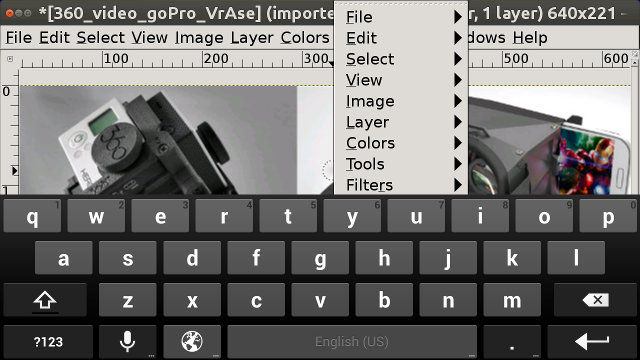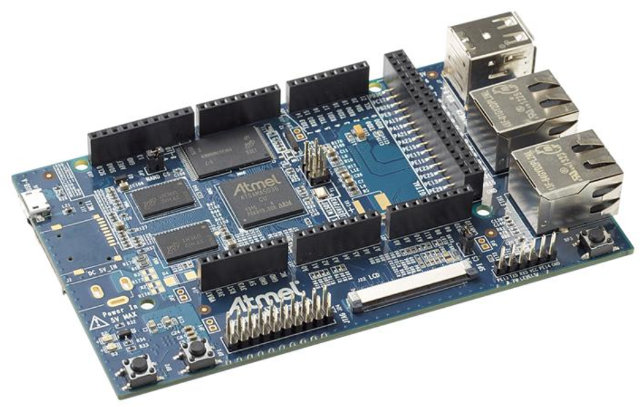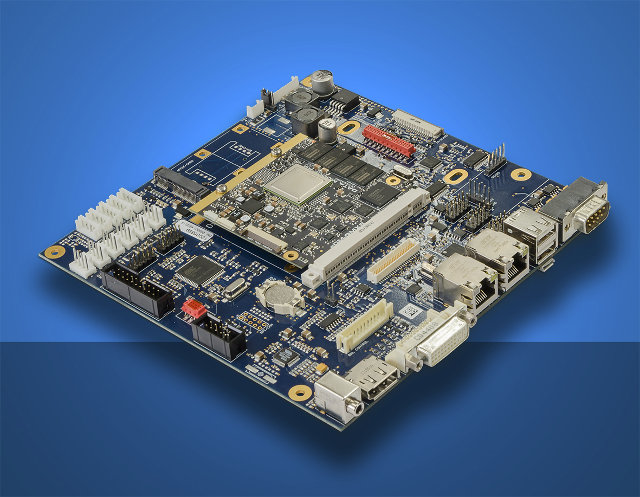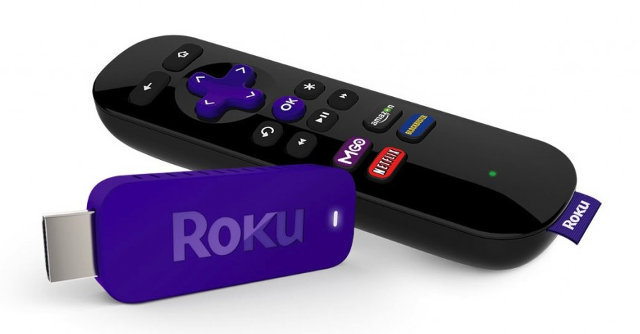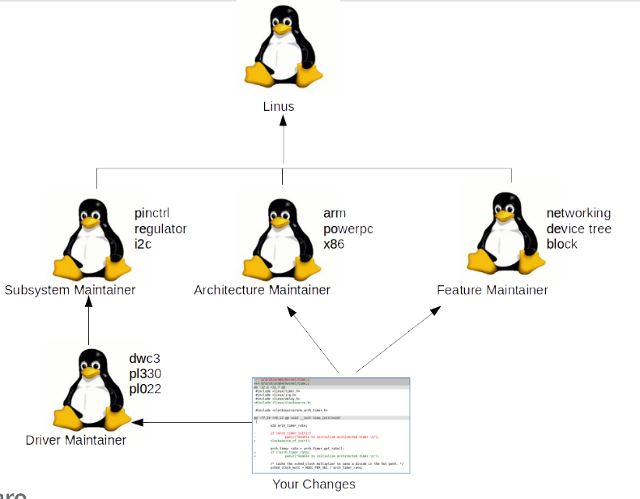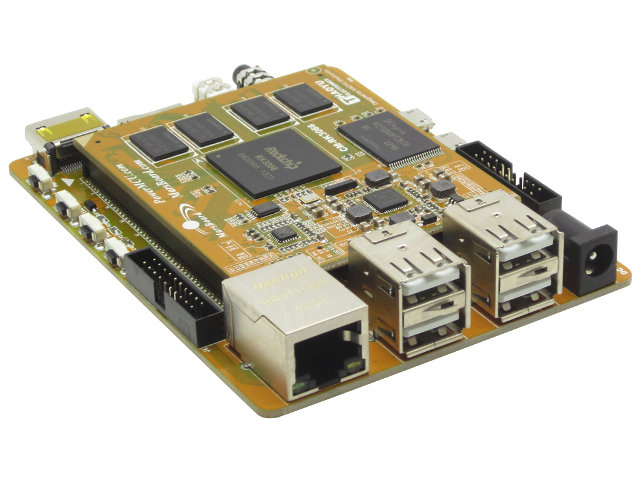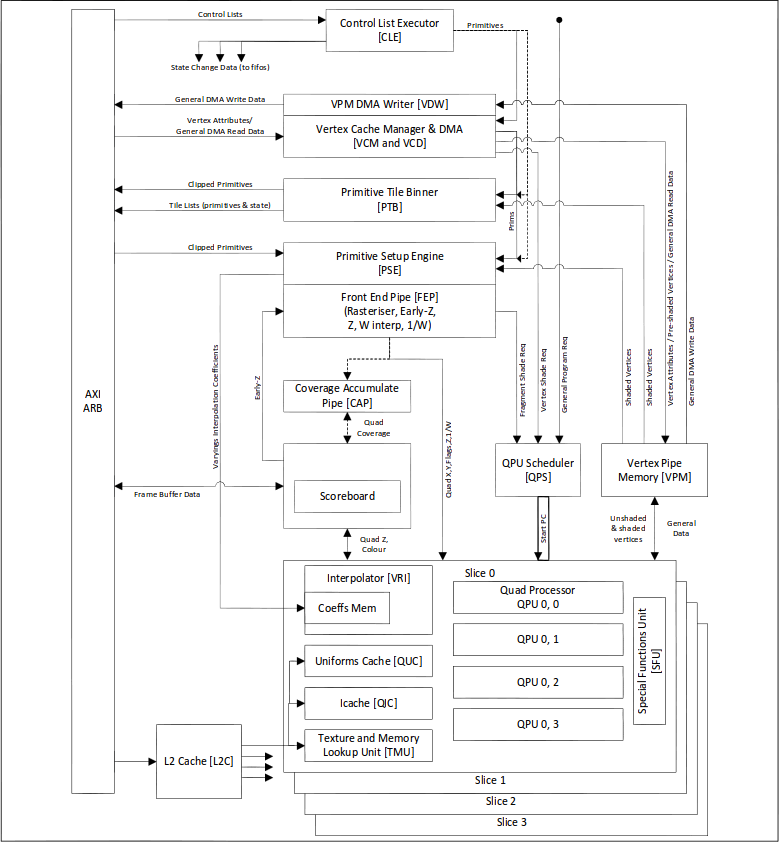It has been feasible to run Linux apps in Android by installing a Linux distribution in a chroot using some app such as Complete Linux Installer, and accessing the graphical application via VNC. I tested this solution with Ubuntu in Android using ODROID-X development board, and it worked fine, except the performance was rather poor. There’s now another solution with XServer XSDL app, X Window System server for Android, that can be used to stream application from a Linux PC or to launch app from a Linux distribution installed in your Android device. I’ve given a quick try in my Android phone, and after installing and running the app, it will give instructions to launch gimp in your Linux PC to use it in the phone: Launch these commands on your Linux PC env DISPLAY=192.168.0.100:0 metacity & env DISPLAY=192.168.0.100:0 gimp Just type this command line into a terminal, and gimp […]
$79 Atmel ATSAMA5D3 Xplained Arduino Compatible, Open Source Hardware Board Powered by SAMA5D3 ARM Cortex-A5 Processor
A few days ago, at Embedded World 2014, Atmel has unveiled ATSAMA5D3 Xplained evaluation board based on SAMA5D36 ARM Cortex A5 micro-processor with 256 MB DDR2, 256 MB flash and numerous ports and expansion connectors, that targets industrial automation, networks, robotics, control panels and wearable applications. Atmel is one of the rare companies that provides support for the latest long term kernel (3.10) and mainline for their embedded solutions, and their latest board is fully open source hardware. Let’s have a look at the board specifications: MPU – Atmel SAMA5D36 Cortex-A5 Microprocessor @ 536 MHz System Memory – 2GBit DDR2 (Micron) Storage – 2GBit Flash (Micron), SD/MMCPlus 8-bit Card slot, 1x Micro SD Card 4-bit slot footprint (meaning not soldered) Connectivity – 1x Ethernet 10/100/1000M, 1x Ethernet 10/100M USB – 1x micro USB Device connector, 2x USB Host connectors Debugging – 1x 6-lead 3V3-level serial port, 10-pin J-TAG connector Expansion […]
DATA MODUL mini-ITX Board Supports Freescale i.MX6 & Intel Bay Trail-I QSeven Modules
DATA MODUL, a specialist supplier of display technology, has recently unveiled eDM-mITX-CB-Q7-Info, a mini-ITX Baseboard for ARM & x86 Qseven modules optimized to drive large panels for digital signage applications. In theory, the board should support any Qseven modules, but for now only Data Modul’s Freescale i.MX6, and Congatec conga-QA3 Intel Atom E3800 series modules have been optimized and officially certified to work with the motherboard. Precisely, the board is optimized and certified for the following modules: DATA MODUL ARM Qseven SoMs: eDM-QMX6 (i.MX6Quad) eDM-DMX6 (i.MX6Dual) eDM-DLMX6 (i.MX6Dual lite) Congatec x86 Qseven SoMs: Conga-QA3 with Atom E3845 (Quad core) Conga-QA3 with Atom E382x (Dual core). Three models: Atom E3827, E3826 or E3825. Conga-QA3 with Atom E3815 (Single core) You may have heard about EDM, a competing module standard, previously, but the eDM prefix in the ARM modules or the mini-ITX board names has nothing to do with this standard, as […]
The New $50 Roku Streaming Stick Drops MHL, Gets a micro USB Port, and a Wi-Fi Remote
The first Roku Streaming Stick was announced early 2012 with an HDMI/MHL port. It turns out MHL did not take as Roku and others, including myself, expected, and even today MHL is not a prominent feature in new TVs, and seldom listed in the specifications. So they’ve just announced a new Roku Streaming Stick, HDMI version, that can be powered via the USB port of your TV, or a standard USB power adapter. The processor and memory have not been disclosed, but we can assume it’s probably based on a Broadcom processor. The rest of the specs are as follows: Video Output – HDMI (720p or 1080p) Audio Output – HDMI with 7.1 and 5.1 surround pass-through support Connectivity – 802.11 dual-band (a/b/g/n compatible) with WEP, WPA, and WPA2 support Misc – Status light, reset button Power Consumption – Less than 2W (typical) when streaming HD video Power Input – […]
Linux Kernel Upstreaming How-To – Linaro Connect Asia 2014
I’ve already written a post about submitting kernel patches to mainline based on a 2011 presentation by Greg Kroah-Hartman, but Matt Porter, Broadcom Landing Team (LT) Technical Lead at Linaro, has given two updated talks entitled “Upstreaming 101” and “Upstreaming 201” at Linaro Connect Asia 2014. There are many planned talked during LCA 2014, and you can get the list as well as links to presentation and videos, as they become available on LCA 14 resources page. The first session “Upstream 101” starts with some definitions such as “upstreaming” (basically getting your code to kernel.org), “mainline”, etc, explains how to get information about the (912) maintainers (tip: it’s in the MAINTAINERS file), how to deal with the 2-week merge windows occurring every 10 weeks or so, but the bulk of the talk detailing the work flow required to upstream code to the Linux kernel. There are basically 5 steps: Preparation – Read […]
$60 MarsBoard RK3066 (Partially) Open Source Hardware Development Board Supports Android & PicUntu
Until now if you wanted a low cost Rockchip development board you’d have to go with Radxa Rock (Quad core RK3188) or WaxBerry Pi2 (Dual core RK3066). Thanks to Haoyu Electronics , the company who made MarsBoard A10, there’s now another option with MarsBoard RK3066 powered by Rockchip RK3066 dual core Cortex A9 SoC with 1 to 2 GB RAM, 4 to 8 GB Flash and lots of ports and expansion connectors. MarsBoard RK3066 is composed of a baseboard (SOM-RK3066) and a computer on module (CM-RK3066) with the following specifications: CM-RK3066 Computer-on-Module: SoC – Rockchip RK3066 dual core ARM Cortex A9 @ 1.6Ghz + Mali-400MP4 GPU System Memory – 1GB DDR3 SDRAM up to 2GB Storage – 4GB Nand Flash & eMMC FLASH Power Management Unit – TPS659102 Misc – TX indicator LED use for debug, Power Indicator LED 10/100M Ethernet PHY – LAN8720A SOM-RK3066 Baseboard: Storage – micro SD […]
Linaro Connect Asia 2014 Opening Keynote – Status and Future of ARMv8 Linux & Android [Video]
Linaro Connect Asia 2014 has just started in Macau today and will take place until Friday. You can follow the sessions live and/or their recordings via Linaro OnAir YouTube Channel. I’ve watched the opening keynote, and embedded the video at the bottom of this post. The keynote focuses on ARMv8 for Linux and Android on servers, mobile devices, digital home, and more, and involves two main speakers: George Grey, Linaro CEO , and Jon Masters, Chief ARM Architecture at Red Hat. The speaker beginning of the video provides some practical information and the schedule for Linaro Connect. The keynote itself really starts around 15:50 with George Grey who spends the first 10 minutes introducing the latest Linaro members: Qualcomm, Mediatek, ZTE, AllWinner and Comcast. He then talks about the new Mobile sub-committee (MOBSCOM) that will focus on big.LITTLE, Android optimization and Android on ARMv8, as well as the soon-to-be-announced Linaro […]
Raspberry Pi Gets Open Source 3D Graphics Drivers and Documentation
The Raspberry Pi was launched 2 years ago, and for its birthday, Broadcom decided to release documentation and open source OpenGL ES 1.1 and 2.0 driver for the Videocore IV GPU. You may remember the Raspberry Pi Foundation already release an open source GPU driver in 2012, but this was only for the part running on the ARM11 core for Broadcom BCM2835 SoC, which is just a few hundred lines of code long, and communicates with a binary blob which does all the work in the GPU itself. This new release however goes much further with a 111 page document entitled “VideoCore IV 3D Architecture Reference Guide“, and open source driver for the 3D System of the GPU. Strangely the release is however not for BCM2835, but instead BCM21553. Broadcom clearly has the source for BCM2835 too, so this must have been made for legal reasons. VideoCoreIV packs a lot […]

